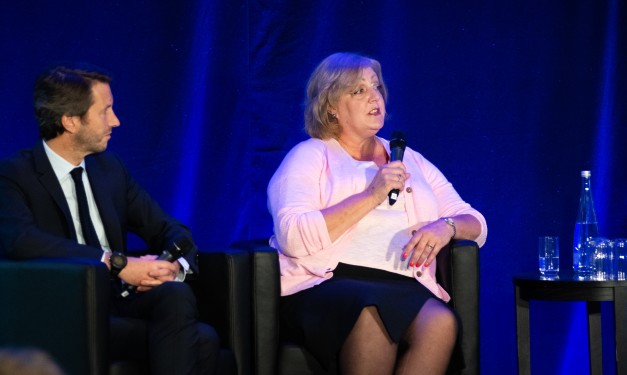The UK is known to be fond of the one share, one vote principle. Companies that come to market with dual-class share structures, diluting the power of investors and bolstering management control, are given a tough time by local institutions.
But belief in shareholder democracy hasn’t typically extended to retail investors, most of whom hold their shares through nominee accounts run by brokers. Under UK law, the nominee is the legal shareholder, so companies aren’t required to pass information or voting rights down to the end investor.
In addition, brokers often sit beneath other brokers, making the chain from company to beneficial owner even more complex. And where information is provided, there may not be time for shareholders to conduct research and make an informed decision.

‘It’s very important that retail investors look to exercise their rights,’ says David Chase Lopes, managing director for EMEA at DF King, the proxy solicitation firm. But it’s not easy for them to do so, he says, because the vehicles they use are normally ‘cost-effective investment structures’.
This could all change, however. A variety of firms, from start-ups to established names, are helping UK retail shareholders have more of a voice in corporate affairs. Crucially, government initiatives are also pushing in this direction. But will retail investors take up the opportunity to be more active?
Meme stock mania
The growing focus on ordinary shareholders is not just a UK issue. During the Covid-19 pandemic, markets around the world reported a surge in retail trading. In the US, meme stock mania highlighted the power of retail holders to come together via social media and give their professional counterparts a bloody nose.
While no UK stocks went ‘to the moon’, the country still witnessed a surge in trading by ordinary investors. A 2021 study by Consumer Intelligence found that 1.8 mn Brits became day traders during lockdown.
The desire to exercise voting rights among this group is high, according to a separate survey by UK registrar Equiniti. In a poll of 3,000 retail investors in the UK and the US, 54 percent say they vote at AGMs either regularly or occasionally. Just one in five say they have no interest in voting.
Tech innovations
For retail investors who want more involvement, a slew of businesses have stepped up to support them. They range from long-standing investment platforms to tech start-ups focused on shareholder campaigns.
Retail brokerages, for example, have rewired their platforms to make voting more accessible. In November 2021, Interactive Investor opted in all accounts for notifications about when they can vote, which it says led to a 30 percent rise in votes processed.
Rival broker Hargreaves Lansdown launched a new digital voting service this January that allows users to vote and register for AGM attendance at close to 6,000 UK and European equities.

‘We have always offered this service to our clients but this capability did not exist digitally previously,’ says a spokesperson for the platform. Historically, clients had to ‘manually identify relevant shareholder meetings’ and then ring up to cast voting instructions, she says.
While brokers are making voting easier, some start-ups go further and encourage smaller investors to get involved in shareholder campaigns.
‘David vs Goliath’
TulipShare, launched in 2021, acts as both an investment platform and shareholder advocacy group. When users invest their money, they can pledge to support a particular campaign. Last year, the London-based firm filed a proposal at Amazon calling for an independent report into warehouse conditions, which won 44 percent of the vote. Other campaigns have targeted Apple, Coca-Cola and Johnson & Johnson.
Initially, TulipShare would partner with other shareholder groups to put pressure on companies, explains Jenna Armitage, chief marketing officer at the fintech, who previously worked on Engine No 1’s successful ‘David vs Goliath’ campaign against ExxonMobil. But now, with more than 28,000 users, it has enough funds to file its own proposals.

‘As soon as we open up a campaign, we’re immediately committing to engage with the IR team around that issue,’ Armitage says. ‘Our first step is reaching out, trying to set up a meeting and trying to get data and information to feed back to our investors. If that engagement fails, we make sure we meet the requirements to file the shareholder proposal.’
While TulipShare is targeted at UK investors, its campaigns focus on US companies because it’s easier to get shareholder proposals passed in that market, she adds. But the plan is to expand to issuers in the UK and Europe as well. ‘People are becoming aware that actually, as an investor, you do have power,’ she says.
‘Pass-through’ voting
The trend for asset managers to allow ‘pass-through’ voting, where they hand power to the end-investors in their funds, has also touched the retail audience. Last year, BlackRock announced it would give UK retail investors in certain products the chance to exercise their vote, based on their level of ownership in the underlying shares. State Street and Vanguard have made similar moves. Supporting this work are firms like Proxymity and Broadridge, which help to link companies, asset managers and end investors.
Tumelo, another UK-based start-up, is offering pass-through voting to institutional and retail shareholders. The platform provides recommendations from proxy advisors to assist decision-making and allows users to set voting policies across their holdings, removing the need to individually assess each AGM.
‘The question we get asked very frequently is: what does this mean for our shareholder meeting?’ says Cas Sydorowitz, global CEO of Georgeson, in reference to pass-through voting.
European companies mostly know who to speak to at their largest asset managers about voting, he says. But when pass-through voting takes off in earnest, companies ‘won’t know who to go to’.
Government action
UK government initiatives are providing a tailwind to those who want to hand more say to retail investors. The Austin Review into secondary capital raisings, published last year, recommended changes to the current system of intermediated shareholdings, noting that ‘efficiencies and economies of scale’ have ‘arguably been prioritized over corporate governance and transparency, particularly in relation to retail investors.’
Following the review, the government appointed Sir Douglas Flint – chair of asset manager abrdn and former chair of HSBC – to run a new taskforce focused on modernizing the UK’s shareholding system. The aims include helping end-investors exercise their rights and supporting issuers with shareholder ID and communication.

Retail investor groups, which have long campaigned for changes to UK market structure, have warmly welcomed these developments.
‘There is huge progress on a number of fronts for better shareholder engagement and democracy. It is great that the government wants to encourage individual investors in UK companies,’ says Cliff Weight, director of ShareSoc.
‘Enabling companies to talk efficiently directly to their shareholders – by registrars collecting the email addresses of shareholders – and shareholders being able to talk to each other to campaign for improvements in governance, company performance or the removal of directors, is the next big step forward in restoring individual shareholder rights.’
Corporate impact
While retail investors are gaining more say in their investments, companies have not yet felt much of an impact, report firms spoken to by IR Magazine for this article.
Retail investors remain key to shareholder votes in some contexts. Many consumer-facing companies have always had a high level of retail ownership. Others have ended up that way after experiencing a major sell-off. And, obviously, in a tight contest every vote matters. But there is little sign yet of retail participation growing at annual meetings per se. Nor do IR teams report an influx of new information requests from their smaller shareholders.
Though retail is not yet voting in greater numbers, Sydorowitz says companies should review how they make information available to this stakeholder group. ‘Companies will need to have a section on their website for individual shareholders, whether they are directly registered or behind a broker,’ he says.

The advice might need to include information about how to vote on different brokerage platforms, notes Sydorowitz: ‘Companies need to think about this – there isn’t a blanket answer for everybody.’
He points out that retail investors have different information demands from other stakeholders, such as institutions, the media and employees, and content will need to be tailored accordingly. Digital communications around the shareholder meeting will become ‘far more important than in the past,’ Sydorowitz adds.
UK retailer Marks & Spencer is one company that has sought to improve online engagement around the AGM. During the pandemic, it switched to a ‘fully digitally enabled meeting’ and continued with this approach last year.
The new-style meeting features TV show production values and questions posed to the board by a journalist, who is referred to as the ‘shareholder advocate’. Investors can also send in questions via video and phone in live during the event. In addition, investors are given access to a video explaining how the meeting will work and a list of all questions put to the board at the retailer’s AGMs since 2012.
Education focus
The 2022 meeting ‘received higher levels of shareholder engagement than previous years,’ says M&S on its website, although the company still had to contend with a 30 percent revolt over its remuneration report.
Technology has a key role to play in helping companies better communicate with their retail holders, said Cynthia Alers, head of IR and M&A at FTSE 250-listed Elementis, during an IR Magazine Webinar on shareholder democracy.
‘The major sources of information for shareholders, both retail and institutional, are all very old-fashioned tools,’ she said. ‘It’s a PowerPoint presentation. It’s an annual report, even if it’s online. Or the dreaded prospectus – I just wrote one last month. It could be 300 pages.

‘Making an informed investment decision on that – with all the warnings that are plastered all over it saying shares can go up and down, you’re responsible for taking advice on this deal – it does scare an uninformed investor into going to other sources.
‘I think companies do need to work harder… Maintaining a website is much better than trying to do a printed annual report. It just takes a lot of time and effort to keep that website up to date.’
Alers, along with other speakers on the webinar, agreed that a key challenge of giving retail investors more say is making sure they are informed enough about corporate issues.
‘It’s a noble cause that the shareholders of a business can have a say in terms of where that business is going,’ said Neil Shah, director of content & strategy at Edison Group, speaking on the webinar. ‘But votes carry power, and you could be pushing a decision that is actually to the detriment of the company.
‘There might be trade-offs – [for example], between sustainability and profitability – that you need to weigh up. Also, you do see the market often getting caught up in near-term fads… There are dangers and I think the response to those dangers is to make sure you are informing, educating and engaging with the people who have that vote.’







